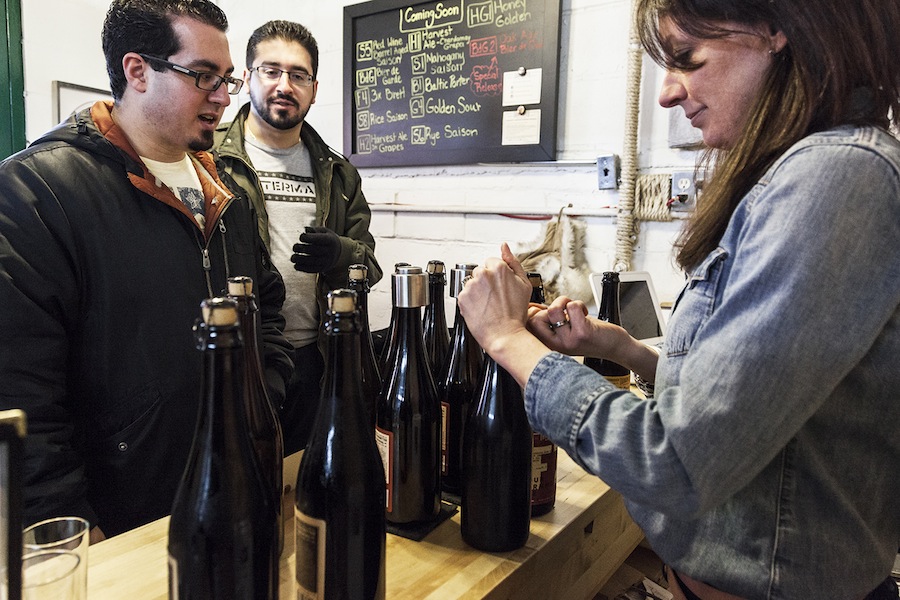On the third Tuesday of each month, an upstate man we’ll call John loads his Subaru Forester with three hulking cardboard boxes and drives them to a friend and co-conspirator, who in turn shepherds the cache to an undisclosed Brooklyn location for distribution.
“I’m pretty sure that our members don’t even realize it’s not legal,” explains the co-conspirator, whom we’ll call Jane, speaking on condition of anonymity (names and places have been changed).
She’s the mastermind behind a six-year-old CSA that brings vegetables and meat from Hudson Valley farms to 350 urban members, mostly in Brooklyn. Two years ago they introduced a novel and legally ambiguous “add on” for their regular customers: beer.
Each cardboard box holds 12 anonymous brown bottles, labeled with small paper tags that recently read Chocolate IPA, Smoked Porter or Winter Warmer. That trio was the CSA’s monthly beer share, brewed by John himself.
Members pay $100 for a half-year membership and take home three different bottles each month, complete with customized tasting notes. The CSA gives John — an obsessive and curious homebrewer for almost a decade — a guaranteed market to offset the costs of his hobby.
“I don’t make money; I drink beer for free,” he explains.
Regulations on alcohol are strict. In New York, selling home-brewed beer is illegal, and the regulatory hurdles to start a licensed brewery are onerous at best. Taking a cue from raw milk sellers, John and Jane advertise their beer CSA as a “Tasting Club,” saying the beer itself is technically a perk.
Both admit they’re in a legal gray area.
Enthusiasts not quite willing to commit to hipster rum-running have lawful alternatives: a handful of fully licensed breweries in the city have started community-supported beer programs.
Transmitter Brewing, a bottle’s throw north of the Brooklyn border, is an upstart operation in Long Island City brewing an unconventional, constantly evolving roster of farmhouse ales. Their extensive library of yeasts and traditional bottle-conditioning process yields beers with funky, sometimes sour flavor profiles — nirvana for hopheads but a tough sell for typical beer drinkers.
“We don’t make flagships,” co-owner Anthony Accardi says, referring to the pale ales and IPAs typically turned out by commercial breweries.
After six months of bureaucracy and paperwork, Accardi and his partner, Rob Kolb, opened Transmitter last spring. They settled on a CSA model for up-front capital and to help spread the gospel of good beer to friends. By the summer they had 125 devotees.
Members trek to the diminutive brewery, in a former auto mechanic’s shop under the Pulaski Bridge, once a month to collect their bounty.
“I live in Greenpoint. I just walk over the bridge,” one says.
The closet-size tasting room offers a handful of choices by the bottle (you can’t drink more than a mouthful there, but it’s open to anyone; a $175 six-month membership gets you two 750ml-bottles each month to take home). A recent pickup featured a toasty golden ale, a tart wild yeast-fermented farmhouse ale and a show-stopping sour ale described as “key lime pie with a horse blanket crust.”
The unorthodox formula seems to be working for the home-brewers-turned-entrepreneurs. Their tiny operation is expanding to accommodate demand from bars, bottle shops and a winter CSA share, all with the legal blessing of New York State.
“People love to see new things,” Accardi explains. “There’s much more demand than beer right now.”
Photo credit: Michael Rudin



